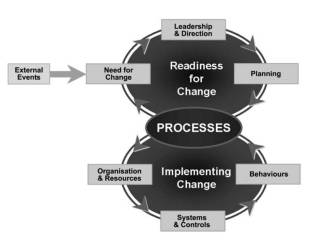 It is not uncommon for change initiatives to fail.
It is not uncommon for change initiatives to fail.
The obvious question to ask is: why do change initiatives fail?
There are obviously lots of reasons. However, one of the most common is that the organisation is not ready to change. This is often recognised by the stakeholders involved in the change. Nevertheless, leaders often believe that they must keep the pressure on and start implementation. This often leads to investment in training programmes and projects. However, if the organisation is ready to change the effort expended in implementation can be wasted or dissipated as change leaders often have to continuously revisit the reasons for change.
Establish the need for change – the key lessons
– the key lessons
Oakland and Tanner (2007) developed the Organisational Change Framework which suggested that more time and effort should be made on preparing for change prior to implementation. The key lessons they suggest are:
- The agenda for change is driven by external events
- Leaders set a clear direction and manage risks
- The need for change must be aligned to the operational issues
- A process approach is central to successful change
- Performance measurement has a key role in supporting change
- A project-based approach increases the chance of success
- External support adds value in managing change and the transfer of knowledge
- Aligning the culture to support changes in people’s behaviour
- Continuous review
The organisational change framework
Their model is shown below:
So in summary, before you begin implementation, is every one ready to change? If not it may be better to delay the implementation and continue the stakeholder work to establish a guiding coalition. As the old saying goes, less haste more speed.
Reference: J.S. Oakland, S.J. Tanner, (2007) “A new framework for managing change”, The TQM Magazine, Vol. 19 Iss: 6, pp.572 – 589





 This is the first in what will be a series of famous quotes about strategy
This is the first in what will be a series of famous quotes about strategy



